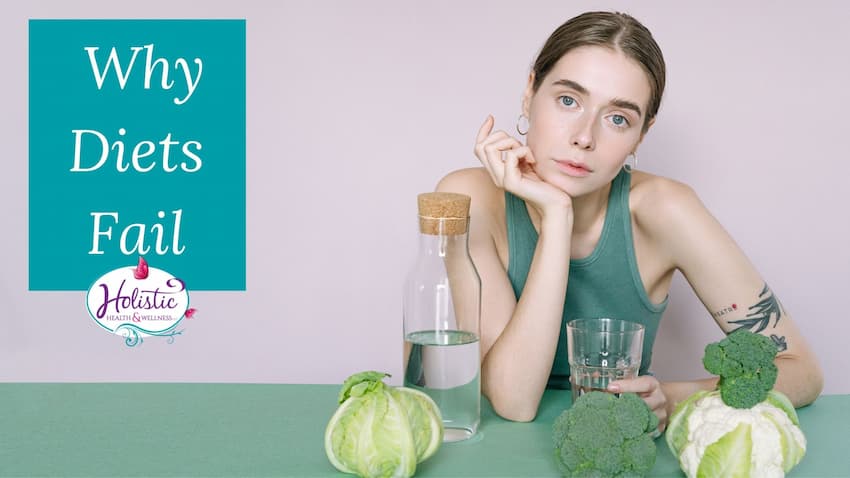Here we are heading into bathing suit season and if you’re anything like me, you’re feeling like your body could use a little toning and lightening after the wooly sweaters and extra layers we hid in through the cooler months.
Of course, we’d all love a ‘Quick Fix.’ After all, if that latest diet worked for so-and-so next door, it should work for you too, right?
As a serial yo-yo dieter of the past myself, (you name it, I’ve probably tried it) I can say this for sure: Fad diets don’t work.
Sure, you may lose some weight following the latest plan, but unless lifestyle habits are created that support healthy living and behaviours shift, the weight loss is not sustainable and returns once you revert to your usual eating and lifestyle habits.
Consider this: The word “die” is right there within the word “diet.”
To help you better understand what I call “diet mentality,” here are the top 5 reasons why diets are doomed to fail:

1. People choose to go on a diet to achieve a short-term goal.
This type of short-term goal is usually to lose weight quickly before an upcoming event.
If you think about diets that way, then aren’t we saying that when we go on a diet, from the onset, it’s just a temporary action used to get immediate results? Once that result is achieved, we stop the diet, and then guess what? Yep! You’ve got it. The old eating habits return, as do those pounds.
2. The Yo-Yo Diet or Weight Cycling
Oh boy. That was me for so long. Those continual cycles – weight off, weight on. A continual rollercoaster which finally led me into the world of anorexia.
Many people go on diets, lose weight, and then gain weight, often more than they lost. And, for some reason, the cycle is repeated. To quote Albert Einstein:

This repeated failure can have negative effects on a person’s mental and emotional health and could result in an eating disorder.
3. Many diets are based on the premise of counting calories.
However, this type of “dieting” uses a formula which is more generalized as opposed to being formulated for an individual. But here’s the thing. Everybody processes calories differently.
The “calorie formula” is based on the premise that caloric expenditure exceeds caloric intake and will therefore result in weight loss. It’s become clear that this isn’t true. Why? Well, not every calorie is created equal.
For example, calories consumed from spinach or sweet potatoes are much more nutrient-dense than calories consumed from a processed, low-fat muffin. So, if you were to consume too few calories, your body goes into survival mode, slowing down the metabolism. And to add insult to injury, you run the risk of your metabolism remaining sluggish once you start consuming more calories.
4. Before even starting a diet, people believe that they will be depriving themselves of foods they love.
For me, I always think of this as having that “diet mentality.” One which I had for so long. And the truth is, is takes a long time to change your mindset and your thinking around dieting when you think about dieting from this perspective.
When you’re entering into a weight loss program with this “diet mentality,” it clearly doesn’t support success. Even worse, the constant experience of deprivation only brings on food cravings that are difficult to ignore.
5. This brings me to the last reason why diets don’t work.
They don’t address food cravings and how to handle them. We all have cravings. But, having the tools to help navigate through those cravings and reach for healthy food alternatives will help to eliminate them.
Unfortunately for many individuals, diets only offer a quick fix to a larger problem.
But the good news is that losing weight doesn’t have to be stressful, painful, or outrageously difficult. Many people lose significant amounts of weight just by tweaking their diet (their way of eating) and making small changes to their routine.
You don’t have to starve yourself or deprive yourself, and you don’t have to abandon your favorite foods.
Learning which foods nourish the body and which don’t is the best approach to eating to lose weight and experience optimal health.
There are so many ways you can choose so that you can achieve that goal and that healthy lifestyle.

Control Your Portions
Take baby steps and slowly reduce your portion size.
Drink a lot of water, green tea, and kombucha
Water is the elixir of life. Increasing your water intake will not only curb your hunger but will improve your skin’s appearance, increase your energy, and help you burn more calories.
Eat foods that are high in fiber
As a rule, foods that are high in fiber are usually low in calories. Fiber keeps your stomach full, curbs hunger pangs and helps limit your calorie intake to a minimum.
Eat foods with high water content
Adding these types of foods will help your stomach feel full and stave off cravings.
Here are a few options:
- watermelon
- zucchini
- strawberries
- celery
- cucumber
- broccoli
- yogurt
- cantaloupe
So, here’s the truth.
Losing weight shouldn’t be about deprivation, starvation, or being miserable. There are some natural ways to lose weight, feel full and satisfied plus give you energy.
I promise you, you’ll find you feel much happier and healthier when you change from “diet mentality” to a healthy lifestyle.

If you’d like some further information about increasing your metabolism, losing some weight without deprivation, increasing your energy, and living that healthy lifestyle, I’d love to chat.
Contact me via email at lwadsworth@verizon.net to schedule your FREE Healthy You Clarity Call. By the end of the call, you’ll have a customized Action Plan with simple steps to move forward confidently and with a better understanding of what’s best for your body plus some resources to help.


